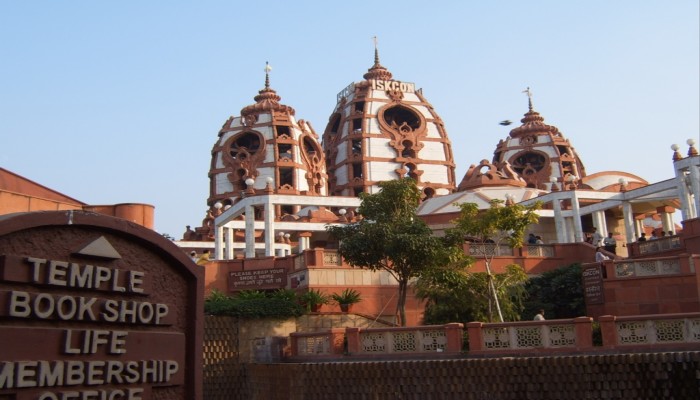Is Jesus A Clone of Krishna? Was it plagiarism or purely miraculous events?
- In History & Culture
- 08:48 PM, Nov 11, 2019
- Renee Lynn
From the beginning of time, to the present day, no other religion has caused more controversy than Christianity. From its very beginning, its views about God and worshipping were different than those of the Greeks and Romans and other religions around the world. Hinduism, the oldest, documented, religion in the world, worship many gods, like that of the Romans and the Greeks. What started this whole “revolution” of Christianity? Apparently, Judaism, a monotheistic religion, influenced Christianity, and opened the door for Christianity to catapult as the world’s biggest religion, and it did. On the other hand, according to the facts documented, you might believe Christianity was originally birthed from Hinduism by the time you finish reading this with shocking comparisons.
As documented by the Dead Sea Scrolls, the Jewish community awaited a Messiah who could save Israel from oppression and turmoil. Jesus promised the Jews that he would not take away their traditional values. Jesus stated, “My kingdom is not of the world” (John 18:36 New International Version). In this statement, Jesus disappointed the Jews, and they believed he is a false prophet trying to devitalize traditional Jewish religion. Jesus would now start a crusade of followers after his crucifixion and resurrection. His disciples are convinced he is truly God and start a world-wide tour of preaching the gospels. One of the first early Christian preachers was the Apostle Paul, preaching the gospels about Jesus Christ to a world already filled with deities. The citizens of the Roman Empire along with the rulers were very accepting of other gods, and the gods of ancient Greece. On the other hand, the Christian religion was not accepting of any such pagan religions.
Now the Hindus in India were attaining their salvation by knowledge, devotion, and works. This salvation is from the seemingly endless cycle of birth, death and rebirth. By contrast, in Christianity, salvation cannot be obtained by any number of good deeds, but by Jesus alone. The Hindus worship many, many gods and believe in reincarnation, by contrast, Christianity beliefs rebuke the notion of reincarnation. India now will be hearing their first Christian sermon on salvation by a Saint Thomas. Saint Thomas is credited with first preaching Christianity in 52 AD, when he arrived in Kerala, India and established seven churches and evangelized throughout Tamil Nadu, India. When Saint Thomas first introduced Christian ideas, they were foreign to Hindus, but they embraced the ideologies of baptism because of its similarities to bathing in the Ganges River. Evangelizing in Kerala and Tamil Nadu, India, Saint Thomas converted many, including a local king, and many average people. After traveling extensively in his missionary activities, he was martyred in A.D. 72, at Mylapore, near Chennai. This did not stop the preaching of the gospel, as a matter of fact, Christianity is growing by leaps and bounds and rapidly attracting many on all levels and classes.
In Hinduism, there is no single founder; it is more a way of life. Hinduism may have originated from 2500 to 1500 B.C. The Vedas are one of the oldest, sacred texts of Hinduism. It has been stated that the Vedas go so far back into the history of mankind that it is impossible to fix a date. Originally it was transmitted orally and then preserved in written form. The tradition of handing down such thoughts from father to son and from teacher to disciple extends the possible date of such compilation further back into the past. However, considering both internal and external evidence, scholars suggest, and put a date of the Vedas at 1200 B.C. The Vedas reflect the practices and beliefs which arose during the long periods of Hindu history. The Vedas contain hymns, prayers, and ritual texts.
The Upanishads are mystical teachings of the philosophy and practices leading to the direct experience of the center of consciousness and absolute reality; they abound in spiritual knowledge. They are the end part of the Vedas, also known as Vedanta. These teachings were probably done between 800 and 400 B.C. The Upanishads form the core of Indian philosophy. It is here that we find all the teachings that are central to Hinduism; the concepts of karma (action), samsara (reincarnation), moksha (nirvana), the atman (soul), and the Brahman (Absolute Almighty).
The Bhagavad-Gita is another sacred and popular religious scripture of Hinduism. Hindus consider the Bhagavad-Gita as a direct message from God. Lord Vishnu incarnated in the form of Lord Krishna. The teacher of the Bhagavad-Gita is Krishna, who teaches how one should conduct oneself in day to day lives, keeping God at the center of one’s awareness and activities. The origin of the Bhagavad-Gita, the date of composition is not known with certainty; however, scholars have suggested that the date of composition of the Bhagavad-Gita is around 150 B.C.
The Christian bible, The Holy Bible, is very sacred religious scriptures for the Christians. The New Testament consists of 27 writings, which were composed from about 50 to 130 A.D. To add to the mystery are the lost years, or the so-called “eighteen silent years” between the ages of 12 and 30, when the Gospels tell us nothing about Jesus during his missing 18 years. It is believed that Jesus spent most of those lost years in India. A discovery made by a Russian Journalist, Nicolas Notovoich, who visited a Tibetan monastery in Hemis, India, in 1894, was given access to documents which claims Hemis as the city of origin of an unknown gospel of the events about the life of a Saint Issa, (Issa is Arabic for Yeshua, who we know as Jesus) in which Jesus is said to travel to India in his lost years. The documents detail an individual who journeyed from Israel, studied in India, Nepal, and Tibet, and then returned back to his homeland where eventually he was executed by the Romans. His followers took up his teachings and began to spread them throughout neighboring lands. The documents were published as the “Unknown Life of Jesus” by Nicholas Notovitch.
There are also some very interesting comparison between Christianity and Hinduism. Brahma, Vishnu, and Shiva, constitute the Trinity of Hinduism. Brahma (creator), Vishnu (preserver), and Shiva (destroyer). The Trinity of Christianity consist of God (the father), Jesus (the son), and The Holy Ghost, constitute the Christian Trinity. Krishna is the second person of the Hindu Trinity, an incarnation of Lord Vishnu. Jesus is also the second person of the Christian Trinity. Here is a comparison of Krishna and Jesus, to set the stage or platform of Christianity’s emulated “new” revolution. The similarities are striking between Jesus and Krishna, and there are many more, but here are just a few.
COMPARISON OF JESUS AND KRISHNA
Jesus and Krishna were called both a God and the Son of God.
Jesus and Krishna were sent from heaven to earth in the form of a man.
Jesus is the son of the Virgin Mary and Krishna is the son of the Virgin Devaki.
Jesus and Krishna nativity is heralded by a star.
Jesus and Krishna were all said to have been placed in a manger basket after birth.
King Kansa tried to kill Krishna by ordering the slaughter of all males born on the same day as Krishna, and King Herod ordered the slaughter of all infants born on the same day as Jesus.
Jesus and Krishna are both visited by three wise men bearing gifts.
Jesus and Krishna were called Savior, and the second person of the Trinity.
Jesus and Krishna’s adoptive human fathers were carpenters.
Jesus performs miracles in the town of Materea in Egypt and Krishna performs miracles in Mathura.
Jesus and Krishna withdrew to the wilderness as adults, and fasted.
Jesus and Krishna were identified as "the seed of the woman bruising the serpent's head."
Jesus was called "the lion of the tribe of Judah." Krishna was called "the lion of the tribe of Saki."
Krishna and Jesus were both crucified, and during crucifixion, Krishna was wounded by an arrow, and Jesus was wounded by a spear, and both claimed: "I am the Resurrection."
Jesus and Krishna were god-men; being considered both human and divine.
Jesus and Krishna were both considered omniscient, omnipotent, and omnipresent.
Jesus and Krishna performed many miracles, including the healing of diseases. One of the first miracles they both performed was to make a leper whole.
Jesus and Krishna cast out indwelling demons, and raised the dead.
Jesus and Krishna selected disciples to spread their teachings.
Jesus and Krishna encountered a gentile woman at a well.
Jesus and Krishna celebrated a last supper, and they both forgave their enemies.
Jesus and Krishna descended into hell, both raised the dead, and both brought back two boys from hell.
Jesus is recorded as saying: "if you had faith as a mustard seed you would say to the mountain uproot yourself and be cast into the ocean" and Krishna is reported as having “uprooted a small mountain”.
The parallels between Jesus and Krishna are amazing. Is Jesus an incarnation of Lord Krishna? Did Jesus when in India read the Bhagavad-Gita and copied Krishna for his “new” revolution for a “new” religion, or are the events carbon copy miracles just like Krishna's miracles? The evidence seems so compelling that maybe Jesus borrowed some ideas, thoughts, themes, while in India to bring back to his homeland, or maybe he reached such enlightenment from the Hinduism teachings, he is a bona fide replica, a reincarnation of Krishna?
Most Christians refuse to accept any other concept of religion. Let’s just say, for example, and give Jesus the benefit of the doubt, maybe he attained such spiritual enlightenment from reading the Bhagavad-Gita while being in India, that his movement was purely innocent, with no intent for plagiarism, but purely miraculous events, following the footsteps of Krishna. Corrupt people had corrupted the bible for their own evil intent, which is to convert, control, buy your way out of hell, etc., but it appears Jesus message was solely based on Hinduism philosophies from India, and I believe this is what Jesus intended.
Whether reincarnation versus resurrection or Krishna versus Jesus, it will always end up in a conversation for debate. So, while the Hindus wait for their Moksha and the Christians wait for Judgment Day, history repeats itself and the world will continue to evolve.
Image for representational purposes only.
Disclaimer: The opinions expressed within this article are the personal opinions of the author. MyIndMakers is not responsible for the accuracy, completeness, suitability, or validity of any information on this article. All information is provided on an as-is basis. The information, facts or opinions appearing in the article do not reflect the views of MyindMakers and it does not assume any responsibility or liability for the same.







Comments